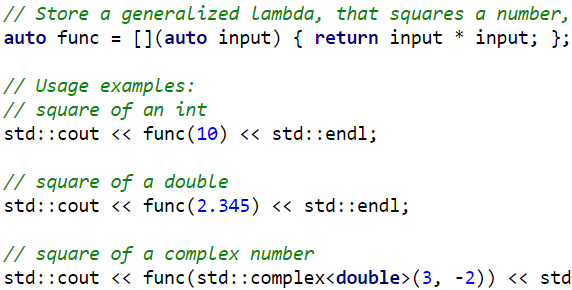Lambda Over Lambda in C++14 -- Chris Kohlhepp
A nice complement to the C++14 lambda article we linked to yesterday:
Lambda Over Lambda in C++14: The Convergence of Modern C++ on the Lisp Programming Style, Part II
by Chris Kohlhepp
From the article:
Let us see how that simplifies under C++14 and generic lambdas.
Three observations are striking immediately:
1) The use case for a template has disappeared entirely. We simply have a generic function argument x. This matches Lisp.2) The code is now entirely as brief as Lisp. Where Lisp has a lot of parenthesis, this style of coding develops a lot of “autos.”
3) The mechanics are identical also. Both functions are actually named lambdas...


 Building on recent C++11 lambda tutorials we've linked to recently, here's one about the brand-new lambda features in C++14:
Building on recent C++11 lambda tutorials we've linked to recently, here's one about the brand-new lambda features in C++14: Here's a recent series that just got a new instalment today: It introduces template basics in a nicely explained and accessible way suitable for a gentle introduction, and then going on to progressively help the reader develop stronger template muscles.
Here's a recent series that just got a new instalment today: It introduces template basics in a nicely explained and accessible way suitable for a gentle introduction, and then going on to progressively help the reader develop stronger template muscles. More rapid-fire "now write this using lambdas" problem-solution drill with Sumant Tambe:
More rapid-fire "now write this using lambdas" problem-solution drill with Sumant Tambe: Recently on the Spot blog:
Recently on the Spot blog: In case you missed it:
In case you missed it: